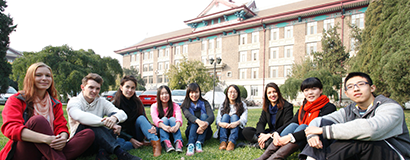The “Excellence 9” League Presidents Forum 2016 and the Seventh Session of the Joint Meeting of University Presidents were held in Dalian on 16 December, 2016. The Presidents of nine member universities of Excellence (E9) attended the meeting and had an in-depth discussion on the mechanisms of the “double first-class” and innovation-oriented cooperation and “excellence talents” cultivation, reaching the consensus on the guidelines and plans for the foreseeable future of the league. 9 keynote speeches were delivered on the topic of “Facing the ‘Double First-class’ Strategy: New Concepts, New approaches, New Strategies of E9”.
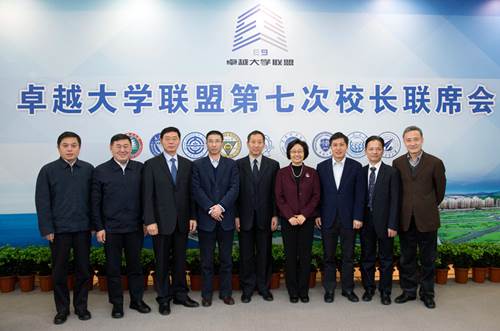
Presidents of all the nine universities of E9 present at the event are Professor Hu Haiyan, President of Beijing Institute of Technology, Professor Zhou Xuhong, President of Chongqing University, Professor Guo Dongming, President of Dalian University of Technology, Professor Zhang Guangjun, President of Southeast University, Professor Zhou Yu, President of Harbin Institute of Technology, Professor Wang Yingjun, President of South China University of Technology, Professor Zhong Denghua, President of Tianjin University, Professor Zhong Zhihua, President of Tongji University and Professor Wang Jinsong, President of Northwestern Polytechnic University. Professor Duan Xianzhong, President of Hunan University was invited to the event by courtesy. Professor Wang Hansong, Secretary of Party Committee of Dalian University of Technology attended and presided the Forum.
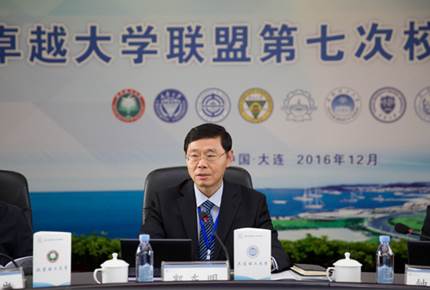
At the Joint Meeting of University Presidents held in the morning, Professor Guo Dongming, DUT President delivered the welcome speech and accepted the Excellence 9 Flag as the 2016-2017 Chair of the league. Professor Guo extended his warmest welcome to the representatives from member universities and spoke highly of the comprehensive and in-depth cooperation among all the E9 members in talents cultivation, joint construction of teaching and research teams, coordinated innovation, international collaboration and exchange, education reform, cultural preservation and innovation, etc. He also praised the invaluable friendship demonstrated by E9, which had not only become a unique treasure to China’s higher education, but had made significant contributions to the development of the field of higher education and the country in general. He believed that the relationship among E9 members would become still closer and tighter, through which mutual sharing, mutual integration, mutual creation, and mutual benefit would be realized. On the road to Excellence, E9 members should make a concerted effort, said Professor Guo, if they were to contribute to the grand rejuvenation of the Chinese nation.
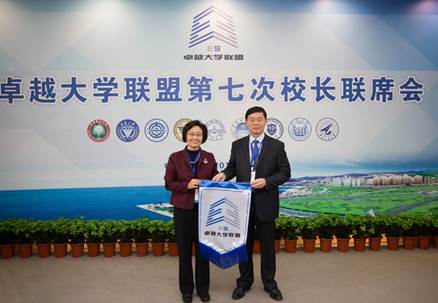
Professor Zhu Hong, Vice President of Dalian University of Technology presided the Joint Meeting. Professor Wang Yingjun, President of South China University of Technology and the 2015-2016 rotating Chair of E9 delivered the E9 Annual Summary Report at the meeting. Professor Jia Zhenyuan, Vice President of Dalian University of Technology submitted the 2016-2017 E9 Work Pla for deliberation, and it was passed officially by the Joint Meeting. Harbin Institute of Technology was designated as the 2017-2018 rotating Chair of E9.
Excellence University League (E9) Action Plan (2016-2020) (draft under review) was developed to lay out the strategic objectives and main targets in the next five years through unified action. The Plan focuses on strengthening the E9 brand in various areas, including the cultivation of undergraduates and postgraduates, enrollment and employment, synergetic innovation, resources sharing, international collaboration, faculty and staff development, policy studies, cultural construction, etc.

In the afternoon, The “Excellence 9” League Presidents Forum 2016 was held in the lecture hall of Bochuan Library at Dalian University of Technology. Professor Wang Hansong, Secretary of Party Committee of Dalian University of Technology welcomed the distinguished guests and expressed the hope that the Forum would serve as a platform for more profound and comprehensive collaborations and exchanges among the E9 members on the new March of building world-class universities and first-class disciplines (“Double First-class” Strategy) so that the league’s voice can be more widely heard and more valuable contributions can be made.
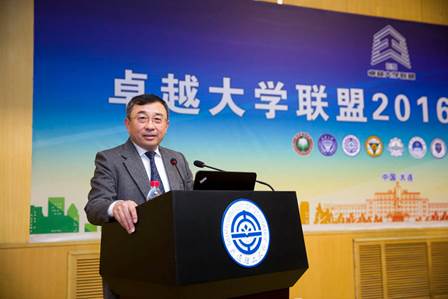
At the Forum, Excellence 9 Presidents shared their views on the challenges of building “world-class universities” with “Chinese characteristics”. The responsibilities and missions were discussed in terms of actively seeking opportunities for development and deepening cooperation.
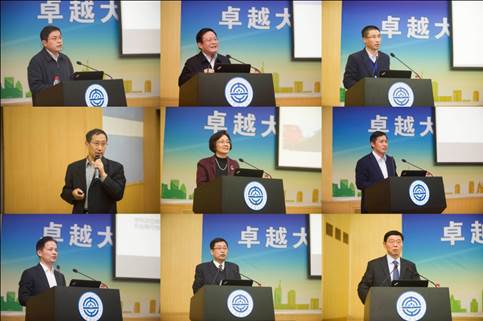
“The talents of engineering graduating from our universities should not only be engineers but men of integrity”, said Professor HuHaiyan, Academician of Chinese Academy of Sciences and President of Beijing Institute of Technology. Excellence 9, with its unparalleled advantage in disciplines of science and technology, should foster innovative and competitive talents with not only local and global views, but integrity and fine self-cultivation. The first question we need to ask about the “Double First-class” Strategy is how to build an education system compatible with world-class institutes of science and technology with our unique Chinese characteristics.
Professor Meng Weidong, Vice President of Chongqing University, elaborated his understanding of the construction of world-class universities. He held that the "Double First-class" Strategy had to be regarded as a value, a spirit, and finally a convention. To achieve the goal, we have to stay true to common sense, to our duty, to the grand mission and the original dream. Firstly, the improvement of the quality of talents must be preceded by the education of the people by virtue. Secondly, favorable academic environment must be created to eliminate impetuous pursuit of short-term successes and to encourage non-utilitarian education and research. To explore true knowledge, to meet the needs of the country, and to achieve the great rejuvenation of the Chinese nation, the key point is to build world-class universities and first-class disciplines with distinctive Chinese characteristics.
“Innovation is the soul of a world-class university, while continuous institutional innovation is the resource of its vitality and creativity,” said Professor Zhang Guangjun, President of Southeast University and Academician of Chinese Academy of Engineering. He believed that all world-class universities shared some features in common: firstly, they enjoyed many a first-class disciplines; secondly, they had gathered a group of academic leaders and world-renowned scholars who had made significant breakthroughs; thirdly, they had made impressive original academic achievements; fourthly, they had cultivated numerous outstanding elites and leaders in different fields. As a result, the key to success for a university is not only to have noble philosophy of education as well as clear objectives, but to build highly qualified and responsible academic groups and to develop constantly updated systems and cultural ecology so that the innovation can be promoted, top achievements can be made, and top talents can be cultivated. To construct world-class universities with Chinese characteristics requires us to take root in our own country while shoulder the mission of the times.
“A world-class university does not necessarily have to be large in scale and complete in its range of disciplines, but has to be endowed with unique characteristics and outstanding competitive edge,” commented Professor Zhou Yu, Academician of Chinese Academy of Engineering and President of Harbin Institute of Technology (HIT). Keeping in mind the three key phrases, namely, Chinese characteristics, world-class universities, and HIT criteria, Professor Zhou believed that only by discovering and preserving its unique features, could a university achieve development and excellence. Universities do not have to be famous for the large scale, but must be renowned for the students’ rigorous style of study; disciplines do not have to be complete, but must be outstanding and unique. In this sense, diverse universities could be irreplaceable with their distinctive characteristics. Tradition, uniqueness and innovation have to be taken as the keys to developing, strengthening and re-energizing a university.
Professor Wang Yingjun, Academician of Chinese Academy of Engineering, President of South China University of Technology gave a speech that focused on how to cultivate top innovative talents. She held that universities served as the principle resource of talents, the first productive force of science and technology, and the key driving force of innovation. Therefore, Excellence 9 has to shoulder the historical responsibilities entrusted by the country, the people and the society, and stay true to its original mission of talents cultivation so as to build teams of excellent talents for the great rejuvenation of the Chinese nation. Professor Wang appealed that we should promote the cultivation of top innovative talents with the help of "Double First-class" Strategy, prepare qualified builders and reliable successors by virtue, and improve students’ practical abilities through the coordinated “Production-Education-Research” programs.
Professor Zhong Denghua, Academician of Chinese Academy of Engineering and President of Tianjin University conceptualized first-class universities from a different perspective. He proposed that the key to the evaluation of a world first-class university was its contributions to specific realms. The purpose of cultivating world-class talents was to promote economic development and social progress. The fruits of world-class research would give birth to new theories, technological reforms and new industries. Moreover, a world-class campus culture would inspire and enlighten our society. In a word, world-class universities should contribute to the national development strategy, enhance their competitive edge in the process of the service- and innovation-driven development, and support the innovation-oriented construction of the country with world-class professionals and researches.
Professor Zhong Zhihua, Academician of Chinese Academy of Engineering and President of Tongji University shared his thoughts on the meanings, features and positioning of world-class universities as well as the connotations of “Chinese characteristics”, which boiled down to three questions: what kind of graduates we want, how we educate them and for whom we educate them. To maintain “Chinese characteristics” was to inherit the rich Chinese culture, take root in the land of China, stick to socialism with Chinese characteristics and serve the development of our nation. Chinese characteristics and world-class universities would be realized through innovating, serving and inheriting; specifically, through innovating the talent cultivation model and technological advancement, serving national and regional socio-economic development and inheriting traditional Chinese culture.
“We have to explore a more significant, new paradigm for the realization of "Double First-class" Strategy in the light of the essence of education as well as the unique features of Chinese universities, and I would like to call this paradigm an essence-oriented one.” Professor Zhang Jun, President of Northwestern Polytechnic University emphasized. He believed that to achieve the construction of world-class universities and first-class disciplines, which had been compared to the new Long March for Chinese universities, more profound and creative studies would have to be conducted. Professor Zhang points out that the approaches to build a world-class university have to be in tune with a university’s general strategies for innovation and development. Therefore, he proposed that by sticking to the distinctive features of disciplines, talents cultivation, open development as well as orderly management, Chinese higher education should be brought back to its correct path and stay true to its original essence.
Professor Guo Dongming, Academician of Chinese Academy of Engineering, President of Dalian University of Technology introduced his idea of "Double First-class" Strategy in terms of “Four relationships”, “Four orientations” and “Four innovations”. He pointed out that excellence without soul would not be real excellence, and the first-class strategy with no regard to the grand mission could not really catch the spirit of real first-class universities. As a result, to construct world-class universities and first-class disciplines, four relationships have to be clarified: the relationship between Chinese characteristics and world-class strategy, between world-class universities and first-class disciplines, between "Double First-class" Strategy and first-class faculty, and between first-class education and first-class research. Oriented towards service, goals, problem-solving and performance, when we aim at building world-class universities with distinctive features in a new historical period, the emphasis should be laid on the innovation of education with a focus on entrepreneurship, innovation of scientific research with a focus on national strategies, the innovation of service with a focus on the transformation of scientific and technological achievements, and the innovation of systems with a focus on the perfection of governance.
Excellence 9 is a league of 9 Chinese universities of science and technology established in 2010. Over the years, adhering to the principle of “Share Resources and Seek Excellence” while meeting the needs of the country, Excellence 9 has shared common interests in the development of undergraduate and postgraduate programs, enrollment and employment, synergetic innovation, international cooperation, policy studies, faculty and staff development, and cultural construction. Enhancing the exchange and cooperation among the 9 universities, it is hoped that Excellence 9, by promoting mutual sharing, mutual integration, mutual creation, and mutual benefit, can not only make greater contribution to the development of China’s higher education, but make the voice of Chinese universities heard all over the world. ( News Source:Dalian University of Technology)






